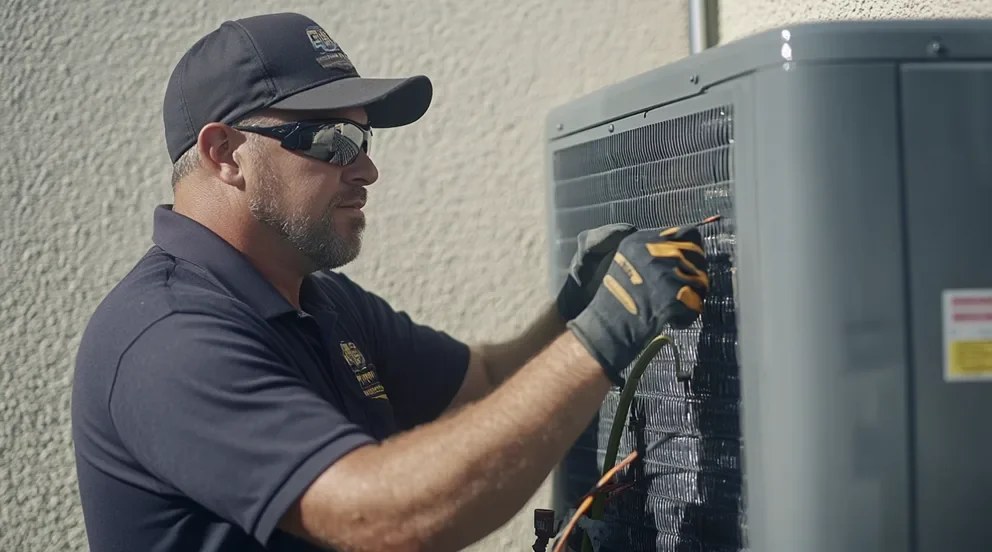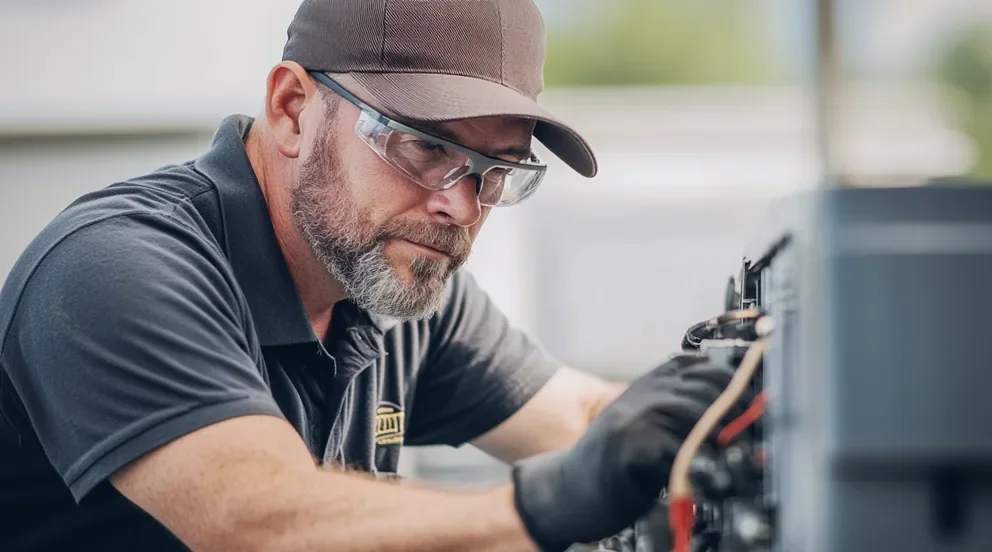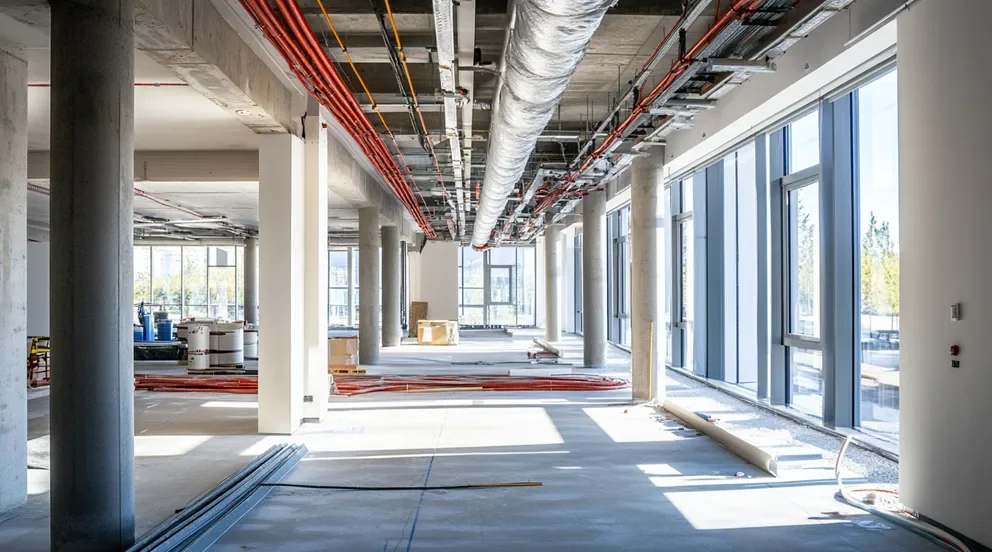Every HVAC tech knows the struggle—flipping through notes, calling the office for specs, or trying to remember which unit a customer had last time. When you're on-site, you need answers fast. That’s where the right HVAC app makes all the difference.
The best ones put job details, calculations, and troubleshooting tools right in your hand, cutting out wasted time and keeping you focused on the fix. Whether you're handling a routine maintenance call or an emergency repair, the right app turns your phone into the best HVAC field tool—not just for you, but for your whole team. Here’s what we’ll cover to help you choose the best HVAC app for you:
- How to choose the right HVAC app for your service technicians
- Key HVAC app features to look for and evaluate based on app type
- 10 best apps for HVAC contractors and technicians
- 5 benefits of having HVAC service apps for your technicians
- 4 important HVAC app FAQs answered
But not all apps are worth the download. Some are clunky, missing key features, or just don’t fit how techs actually work in the field. The right HVAC app should feel like a tool, not a task—helping you move faster, work smarter, and stay connected. Next, we’ll break down exactly what to look for when choosing an HVAC app that’s actually built for the way you work.
How to choose the right HVAC app for your service technicians
Finding the right HVAC app isn’t just about downloading the most popular one. It needs to fit the way your team works in the field—helping them access critical data, streamline tasks, and improve job efficiency without slowing them down. A great app should work like a digital toolbelt, keeping everything techs need right on their phone or tablet. Before picking one, here’s what to consider:
- Usability on-site – Is the app easy to use with gloves on? Can techs quickly log job details, check system specs, or pull up past service history without fumbling through menus?
- Offline functionality – HVAC techs don’t always have a strong signal. Does the app let them access key info and input data even when offline, syncing later when they regain service?
- Integration with other tools – Does the app connect with inventory systems, dispatch software, and invoicing tools? Can it eliminate double entry and reduce wasted time?
- Mobile-first design – Some apps are just desktop tools shrunk onto a phone. Is this app built specifically for mobile, or does it feel clunky and frustrating in the field?
The best HVAC apps enhance how techs operate in real-time. From pulling up schematics to automating service reports, the right features can make or break your workflow. Next, we’ll dive into the must-have features that separate a solid HVAC app from just another download.
Key HVAC app features to look for and evaluate based on app type
Not all HVAC apps are created equal. Some are designed to help with job scheduling and dispatch, while others focus on diagnostics, calculations, or business management. The right app depends on what techs need in the field—quick access to data, seamless communication, and mobile-friendly tools that actually help get the job done.
Below, we break down the top categories of HVAC apps, what they do, and the key features that set the best ones apart.
Scheduling & dispatching
Scheduling and dispatching apps are the backbone of field operations. They help HVAC techs receive job assignments, access service history, and navigate to worksites efficiently. The best ones don’t just push job details—they keep techs connected in real-time with office staff and customers by using a dedicated HVAC scheduling app.
To learn more about how an HVAC app helps with this, check out our comprehensive guide to HVAC scheduling & dispatching.
- Live Dispatch Board – Ensures techs get the right jobs at the right time, with updates pushed instantly to their mobile devices
- Route Optimization – Reduces wasted time by mapping the fastest way to the job site
- Customer & Job History Access – Lets techs see past service records, unit details, and notes before they arrive
- Mobile Work Orders – Eliminates paperwork by allowing techs to update job statuses and add notes on-site
Diagnostics & troubleshooting
When you’re on-site and something isn’t working right, digging through manuals isn’t an option. These apps help HVAC techs quickly diagnose problems, check error codes, and troubleshoot systems in real time.
- Error Code Library – Provides instant access to manufacturer-specific fault codes and recommended fixes
- Live System Readings – Connects to Bluetooth-enabled tools to monitor pressures, temperatures, and airflow.
- Built-in Troubleshooting Guides – Walks techs through common issues and solutions without needing to call the office
- Offline Access – Allows techs to retrieve data even when there’s no cell service in a basement or mechanical room
Load calculation & system design
Accurate load calculations make or break a system’s efficiency. These apps help techs perform complex calculations on the go, ensuring they’re installing the right-sized system for the job.
- Manual J, D, and S Calculations – Generates heating and cooling load estimates based on industry standards
- Duct Sizing & Layout Tools – Helps techs visualize and plan duct routes to maximize airflow efficiency
- BTU & Airflow Calculators – Determines cooling capacity needs based on space dimensions and insulation
- Integration with Equipment Databases – Allows techs to cross-check system requirements with manufacturer specifications
Business management & invoicing
A good HVAC app doesn’t just help in the field—it keeps the business running smoothly behind the scenes. These apps help with everything from invoicing to tracking expenses, using an HVAC billing app to make sure techs get paid on time and jobs are properly billed.
- Digital Invoicing – Generates invoices on-site and allows customers to pay immediately
- Time Tracking & Payroll Integration – Logs work hours and syncs with payroll for accurate paychecks
- Customer Management (CRM) – Stores client details, work history, and upcoming service needs
- Inventory & Parts Tracking – Prevents job delays by showing techs real-time stock availability
Training & technical resources
No matter how experienced a tech is, there’s always something new to learn. Training apps provide easy access to HVAC courses, reference materials, and video tutorials, ensuring techs stay up to date with the latest industry standards.
- Step-by-Step Repair Guides – Walks techs through complex repairs with videos and illustrations
- Certification & CEU Tracking – Keeps track of licensing requirements and completed training
- Equipment & Wiring Diagrams – Provides quick access to detailed schematics for various HVAC models
- Augmented Reality (AR) Tools – Allows techs to overlay schematics onto real-world systems for faster troubleshooting.
Whether it’s scheduling jobs, diagnosing issues, calculating loads, managing invoices, or learning on the go, the right HVAC app can transform how technicians work in the field. But not all apps hit the mark—next, we’ll break down the best options available, helping you choose the one that fits your team’s needs.
10 best apps for HVAC contractors and technicians
Wrenches and gauges used to be all that a tech needed, but these days, your phone is just as essential as your toolbag. The right HVAC app can cut down on wasted time, speed up troubleshooting, and keep jobs moving smoothly—whether it’s pulling up service history, running diagnostics, or knocking out invoices before leaving a site.
Below, we break down the best HVAC apps, starting with BuildOps, the top pick for field service management, followed by other must-have tools built to help techs work smarter in the field.
Best field service management HVAC apps
Keeping an HVAC business running smoothly takes more than just skilled technicians—it requires efficient scheduling, real-time job tracking, and seamless communication between the office and the field. Field service management apps give techs instant access to job details, customer history, and invoicing tools, ensuring they have everything they need to complete a job without delays. The right app reduces downtime, minimizes errors, and keeps teams connected, no matter where the job takes them.
1. BuildOps
BuildOps is the go-to field service management app for commercial HVAC contractors, offering an all-in-one platform that streamlines everything from dispatch to invoicing. It connects technicians with real-time scheduling, dispatch, and customer history, making every service call more efficient. Techs can pull up job details, update work orders, and even generate invoices—all from their mobile device, ensuring they have everything they need to complete the job without delays.
Industry Specialization: Commercial
How Pricing Works: Subscription-based, per technician, with custom pricing based on company size and needs.
What Sets It Apart: Designed from the ground up for commercial HVAC teams, BuildOps keeps every job running smoothly with real-time dispatching, AI-driven notetaking, and an advanced search system that puts customer history, equipment details, and job updates right at your fingertips—no more digging through paperwork or making extra calls to the office.
Key Features:
- Live dispatch board – Technicians get instant job updates with real-time scheduling
- AI-guided notetaking – Automatically organizes service details, saving time on reports
- Mobile job tracking – Techs can log work orders, update statuses, and sync with office teams on-site
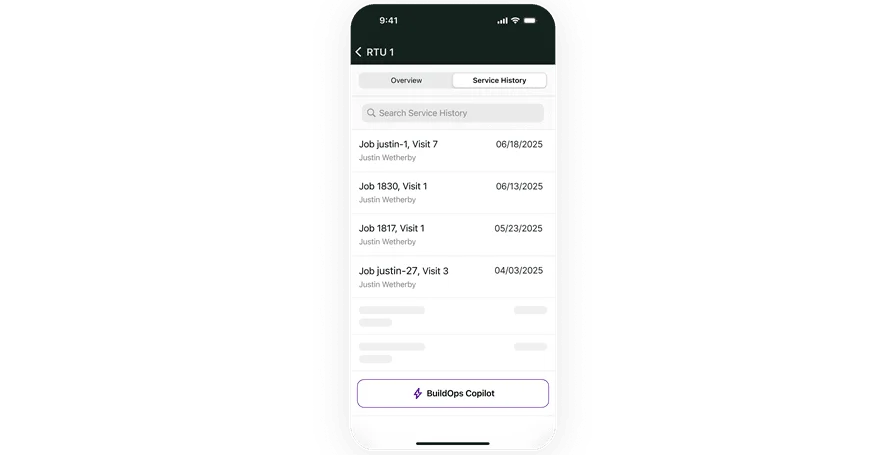
Curious how it works?
See how BuildOps helps HVAC contractors streamline field operations.
2. FieldEdge
Image Source: FieldEdge
FieldEdge is a mobile-first field service management app that helps HVAC technicians reduce office trips, stay organized, and speed up invoicing. It’s designed for small to mid-sized HVAC businesses, but some users note that its reporting and customization options feel limited, especially for teams that need deeper insights into field operations.
Industry Specialization: Residential & Light Commercial
How Pricing Works: Monthly subscription with per-user pricing and customized plans based on business needs.
What Sets It Apart: Seamless QuickBooks integration, allowing real-time syncing of invoices, payments, and customer records, making bookkeeping effortless for HVAC businesses.
Key Features:
- Drag-and-drop scheduling – Easily assign and reschedule jobs with a visual calendar
- On-the-go estimates & invoicing – Techs can create quotes and send invoices instantly from the app
- Live customer history access – View past service records, equipment details, and job notes in real-time
See how the FieldEdge mobile app keeps HVAC teams efficient.
3. Housecall Pro
Image Source: Housecall Pro
Housecall Pro is a field service management app built primarily for small to mid-sized HVAC businesses, helping them manage scheduling, invoicing, and customer communication all in one place. While it’s a great fit for residential contractors, some users feel it lacks advanced reporting and customization options, making it less ideal for larger teams handling complex commercial projects.
Industry Specialization: Residential & Small Commercial
How Pricing Works: Monthly subscription with per-user pricing and tiered plans based on features.
What Sets It Apart: User-friendly interface designed for small teams looking for an easy way to manage jobs, invoices, and customer interactions on the go.
Key Features:
- Automated job scheduling – Helps assign and reschedule jobs with just a few taps.
- Mobile invoicing & payment processing – Allows customers to pay directly through the app
- Real-time technician tracking – Keeps office staff updated on job progress and location
Check out Housecall Pro’s mobile app for field service management.
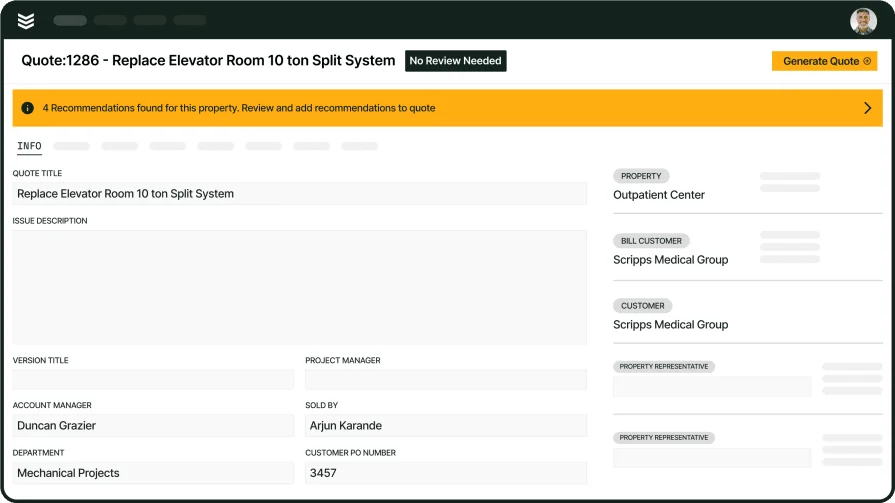
Check out our HVAC platform
See how we help commercial HVAC contractors keep field techs on task.
Best HVAC apps for running diagnostics and troubleshooting problems
When an HVAC system isn’t working right, guesswork isn’t an option. Whether it’s low refrigerant, poor airflow, or an electrical issue, techs need accurate data fast to pinpoint the problem. That’s where diagnostic and troubleshooting apps come in—they connect with Bluetooth-enabled tools, provide error code lookups, and guide techs through step-by-step solutions in the field. These apps cut down on unnecessary callbacks and get systems back up and running faster.
4. measureQuick
Image Source: measureQuick
measureQuick is a powerful diagnostic app that works with Bluetooth-enabled gauges, thermometers, and airflow meters to analyze HVAC system performance in real time. It helps techs spot inefficiencies, troubleshoot faults, and verify system performance, ensuring every install or repair is dialed in perfectly. However, some techs find it requires more advanced knowledge to interpret the data effectively.
Industry Specialization: Residential & Commercial
How Pricing Works: Free basic version; premium features available via subscription.
What Sets It Apart: Aggregates data from multiple smart tools and provides a comprehensive system performance analysis in one place.
Key Features:
- Live system diagnostics – Reads airflow, refrigerant charge, and electrical data in real time
- Fault detection & recommendations – Identifies system issues and provides troubleshooting steps
- Cloud job storage – Saves past diagnostics for future reference and reporting
Explore how measureQuick’s app can improve your diagnostics.
5. Bluon HVAC
Image Source: Bluon
Bluon HVAC is a technician-focused troubleshooting app that provides manuals, retrofit guides, and a massive refrigerant database to help diagnose system issues. It’s particularly useful for techs working with older units or handling R-22 replacements, with a strong focus on documentation and reference materials over live diagnostics.
Industry Specialization: Residential & Commercial
How Pricing Works: Free to use with account registration.
What Sets It Apart: Offers a library of over 45,000 HVAC model manuals and retrofit guides, making it a great tool for troubleshooting older systems.
Key Features:
- Comprehensive error code library – Quickly looks up system faults and recommended fixes
- Step-by-step retrofit guides – Helps transition from R-22 to modern refrigerants
- Live support access – Connects techs with HVAC experts for troubleshooting help
Check out Bluon’s HVAC app for troubleshooting support.
Best HVAC apps for making precise calculations
Getting HVAC calculations right isn’t just about accuracy—it’s about efficiency, energy savings, and system longevity. Whether it’s load calculations, airflow measurements, or refrigerant charging, the right app helps techs quickly and correctly crunch the numbers they need in the field. These tools eliminate guesswork, reduce errors, and make sure every install or repair is optimized for peak performance.
6. HVAC Buddy
Image Source: HVAC Buddy
HVAC Buddy is a go-to app for refrigerant charging and superheat/subcooling calculations, helping techs dial in system performance with precision. While it’s a solid tool for quick calculations, some users find that it lacks advanced features like multi-zone load calculations or integration with other HVAC tools.
Industry Specialization: Residential & Commercial
How Pricing Works: One-time purchase, no subscription required.
What Sets It Apart: Straightforward refrigerant calculations for fast, accurate system tuning without unnecessary complexity.
Key Features:
- Superheat & subcooling calculator – Ensures refrigerant charge is optimized
- Multi-refrigerant support – Works with dozens of refrigerants, including newer eco-friendly options
- Unit conversion tools – Easily switch between Fahrenheit/Celsius and PSI/kPa
Check out HVAC Buddy for quick, reliable system calculations.
7. Ref Tools by Danfoss
Image Source: Danfoss
Ref Tools by Danfoss is an all-in-one mobile toolkit for HVAC technicians, offering pressure-to-temperature conversion, refrigerant data, and other critical calculations. While it's packed with features, some techs mention that it focuses more on refrigerant data than broader HVAC load calculations.
Industry Specialization: Residential & Commercial
How Pricing Works: Free to download and use.
What Sets It Apart: Comprehensive refrigerant data and easy-to-use PT chart functionality, making it a great tool for refrigeration and HVAC techs.
Key Features:
- Refrigerant slider – Converts pressure to temperature for 80+ refrigerants
- Low-GWP tool – Helps techs find climate-friendly refrigerant alternatives
- Troubleshooting support – Includes guides for system diagnostics
Have a look at Ref Tools by Danfoss’ app for refrigerant calculations.
Best HVAC apps for business management and productivity
Running a successful HVAC business also means keeping operations running smoothly behind the scenes. Business management and productivity apps help with everything from invoicing and payroll to customer relationship management (CRM) and team communication. These tools cut down on paperwork, automate repetitive tasks, and ensure techs spend more time in the field—not buried in admin work.
8. ServiceWorks
Image Source: ServiceWorks
ServiceWorks is an HVAC business management platform that helps contractors manage dispatching, invoicing, inventory, and customer relationships in one system. While it’s packed with features, some users find that it has a learning curve, especially for smaller teams that need a simpler tool.
Industry Specialization: Residential & Commercial
How Pricing Works: Monthly subscription based on the number of users and features.
What Sets It Apart: Comprehensive all-in-one platform with inventory tracking, dispatch, and CRM features designed for HVAC businesses.
Key Features:
- Automated scheduling & dispatching – Assigns jobs based on location and technician availability.
- Inventory management – Tracks parts and equipment usage across multiple job sites.
- On-site invoicing & payment processing – Allows customers to pay instantly
Learn more about ServiceWorks for HVAC businesses.
9. Jobber
Image Source: Jobber
Jobber is a business management tool built for HVAC contractors, helping teams organize quotes, scheduling, invoicing, and customer management in one platform. While it’s perfect for residential and small commercial businesses, some larger companies find it lacks advanced reporting and multi-location support.
Industry Specialization: Residential & Light Commercial
How Pricing Works: Monthly subscription with pricing based on users and features.
What Sets It Apart: User-friendly scheduling and quoting tools that help HVAC contractors win more jobs and get paid faster.
Key Features:
- Online job booking – Customers can request jobs directly through the app
- Automated follow-ups – Sends reminders for estimates, invoices, and payments
- GPS tracking for techs – Lets business owners monitor field teams in real-time
Try Jobber’s mobile app to simplify your HVAC business operations.
10. Service Fusion
Image Source: Service Fusion
Service Fusion is a powerful field service management and business operations app, offering job scheduling, invoicing, and fleet tracking. It’s an excellent option for growing HVAC companies, but some users note that its mobile app isn’t as robust as the desktop version.
Industry Specialization: Residential & Commercial
How Pricing Works: Subscription-based with monthly pricing, no per-user fees.
What Sets It Apart: Advanced fleet tracking and job management tools designed to help HVAC businesses scale.
Key Features:
- Drag-and-drop scheduling – Quickly assign and adjust jobs in real-time
- Fleet GPS tracking – Monitor vehicles and optimize routes for efficiency
- Customizable invoicing & payments – Accepts credit cards, ACH, and financing options
Discover how Service Fusion’s mobile app can help your HVAC field techs.
Expert Tip
If you’re curious about how software can play a role in managing your HVAC operations, check out this list of the best HVAC software. There are many different software options available, and the best one for you will depend on your specific needs. Some of the factors you may want to consider include the size of your business, the type of HVAC equipment you use, and your budget.
5 benefits of having HVAC service apps for your technicians
The right HVAC service app isn’t just a convenience—it’s a game-changer for field technicians. Whether it’s streamlining workflows, reducing paperwork, or improving job accuracy, these tools help techs work faster, smarter, and with fewer headaches. A good HVAC app keeps everything in one place—job details, service history, schematics, and invoices—so techs can focus on the job, not the admin work. Here’s how they make a real difference in the field:
1. Faster job scheduling and dispatching
Wasting time waiting on job assignments or calling the office for details slows techs down and cuts into productivity. With scheduling software and dispatching app, techs get real-time job updates, optimized routes, and instant access to customer history—all from their mobile device. This means less back-and-forth, fewer delays, and more completed jobs in a day.
Expert Tip
Looking to organize your schedule? Check out this guide and learn how to choose the right HVAC scheduling software.
2. Instant access to job history and equipment details
Walking into a job blind—without knowing the customer’s service history or equipment specs—can turn a quick fix into a long guessing game. HVAC apps store service history, past repairs, and equipment details, so techs always have the full picture before they even step on-site. This leads to faster diagnostics, fewer mistakes, and better service for the customer.
3. On-the-spot invoicing and payment processing
Paper invoices get lost. Customers forget to pay. Chasing payments is a hassle. HVAC service apps with built-in invoicing let techs generate, send, and process payments on-site—eliminating billing delays and keeping cash flow steady. Some even integrate with QuickBooks or offer financing options, making it easier for customers to approve and pay for services immediately.
Expert Tip
To learn more about the benefits of having integrated invoicing and payment capabilities, check out our HVAC invoicing guide.
4. Built-in troubleshooting and diagnostic support
When a tech runs into a tricky issue, an HVAC app with error code lookups, refrigerant calculators, and troubleshooting guides can mean the difference between solving the problem on-site or needing a second visit. Many apps now sync with smart HVAC tools to provide real-time system diagnostics, so techs can get accurate readings and suggested fixes without guesswork.
5. Improved communication between techs and the office
Nothing slows a job down like miscommunication—whether it’s missing job notes, unclear instructions, or delays in getting approvals. HVAC service apps with built-in CRM keep techs connected to dispatch, office staff, and even customers in real-time. Whether it’s updating job statuses, requesting parts, or getting approvals, everything stays organized and instantly accessible.
4 important HVAC app FAQs answered
HVAC apps help technicians work smarter, stay organized, and improve efficiency in the field. Whether you’re looking for scheduling tools, diagnostic apps, or business management solutions, knowing how these apps work—and what they cost—can help you choose the right one. Below are answers to the most common questions about HVAC service apps.
1. What is an HVAC app for contractors?
An HVAC app is designed to help contractors manage jobs, diagnose issues, and streamline business operations. These apps offer features like scheduling, invoicing, troubleshooting, and customer management, ensuring technicians have the tools and data they need—right from their phone or tablet.
HVAC apps can fall into different categories, here are the three most common:
- Scheduling & dispatch apps – Assign jobs and optimize routes
- Diagnostic & troubleshooting apps – Provide system data and error code lookups
- Business management apps – Handle invoicing, estimates, and customer records
2. How do HVAC services apps work?
HVAC apps function by connecting technicians, office staff, and customers through a single platform. Depending on the app, they may:
- Provide real-time job assignments with customer details and service history
- Offer equipment diagnostics with Bluetooth-enabled tools and troubleshooting guides
- Enable digital invoicing so customers can pay on-site
- Sync with other business tools like QuickBooks, inventory tracking, and CRM systems
These apps eliminate paperwork, speed up job completion, and ensure better communication between teams.
4. Who needs HVAC apps the most?
HVAC apps are essential for:
- Field Technicians – Access job details, troubleshoot issues, and complete reports faster
- Business Owners & Managers – Track team productivity, manage scheduling, and automate invoicing
- Customer Service Teams – Handle bookings, customer follow-ups, and service history
- Sales & Estimators – Generate quotes and track customer leads for new installations
Whether you’re a small residential contractor or a large commercial HVAC business, these apps help you stay competitive and efficient.
5. How much does HVAC apps for businesses cost?
Pricing varies based on features, number of users, and business size, but can generally be sorted into 3 tiers of pricing:
- Free Apps – Basic versions with limited features (some diagnostic or reference apps)
- Subscription-Based Apps – Typically anywhere from $20–$200/month per user for scheduling, invoicing, and job tracking
- Enterprise Solutions – Custom pricing for large HVAC companies with multiple users and locations
Some apps offer free trials, while others charge one-time fees for full access. Pricing often varies based on feature complexity, integration capabilities, and the level of field access they provide. Choosing the right plan means understanding your team's needs—from the number of technicians in the field to the types of tasks they handle.
Deep Dive
If you're comparing options, check out our helpful HVAC software buying guide, which breaks down key factors to consider when evaluating different apps for your business.
Most HVAC apps focus on just one aspect—scheduling, invoicing, or diagnostics—but rarely do they bring everything together. That leaves technicians jumping between tools, wasting time on admin work instead of getting the job done. The best solutions keep techs connected, automate workflows, and eliminate unnecessary back-and-forth between the field and the office. That’s where BuildOps stands out.
BuildOps is built specifically for commercial HVAC teams, combining dispatch, job tracking, invoicing, and real-time data access in a single, powerful platform. Unlike other apps that only cover one piece of the puzzle, it integrates every critical feature—helping technicians work faster, stay connected, and complete jobs with less hassle and more efficiency.
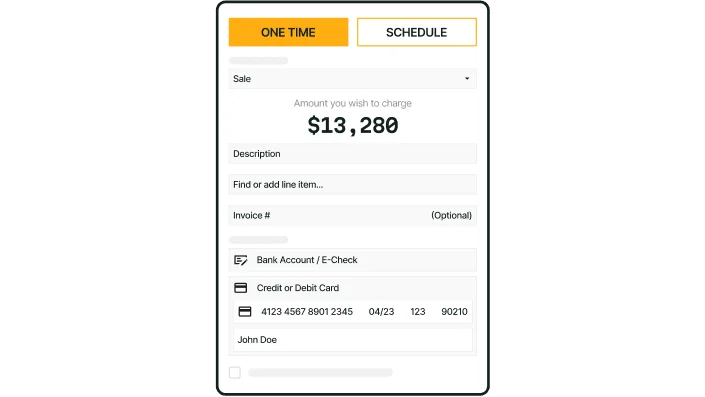
Want to transform your HVAC operation?
Find out how to connect field techs with the information they need to speed up jobs.
